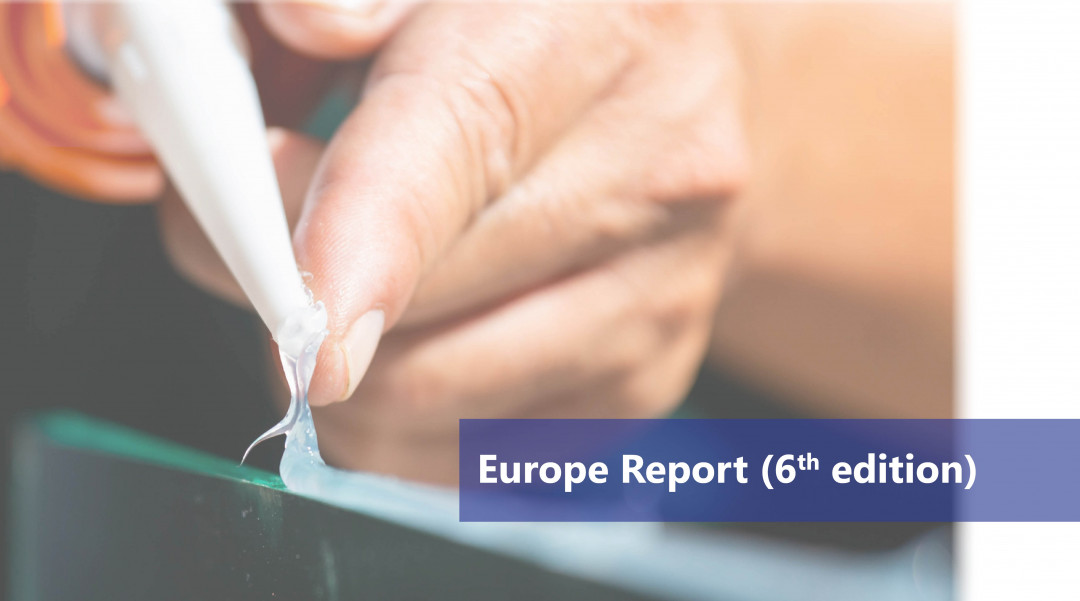
Reversible Adhesives for the Circular Economy
Adhesives should be safe, non-toxic and easy to recycle: The industry is under considerable pressure to use environmentally friendly joining processes – whether packaging or construction materials, vehicle parts, shoes or smartphones need to be joined. Ceresana has analyzed the European market for adhesives in a market study for the sixth time. The new market study shows that adhesive products that are at least partially made from renewable raw materials or are biodegradable are currently gaining in importance. In total, the European demand for adhesives amounted to 3 million tonnes in 2023.
Adhesives also contain fillers, plasticizers and other additives, but consist mainly of plastics and solvents. Organic solvents in particular, such as xylene or toluene, can be highly flammable and harmful to health. Increasingly strict regulations on emissions of volatile organic compounds (VOCs) are driving the search for alternatives. In the European adhesives market, water-based adhesives, which are considered to be more environmentally friendly, already account for around 51 % of total demand. For many high-performance applications, however, solvent-borne adhesives remain indispensable, for example in aerospace, shipbuilding and the automotive industry. Research and innovations in the adhesives market are primarily aimed at improving water and weather resistance, shortening curing times and increasing adhesive strength. As the results of the market study show, reversibility is also increasingly in demand: To facilitate recycling or repairs, hot melt adhesives are increasingly being formulated in such a way that they can be easily removed or renewed. Reactive adhesives, which cure using UV light, heat, activator components or other mechanisms, are used in particular for structural, high-strength and durable bonds, for example for electronics, car body parts or medical technology.
Growing Demand for Special Adhesives
The European market is increasingly demanding that adhesive systems support special functions of the end products. For example, packaging for frozen food must remain stable even under extreme conditions. Adhesives for windows and doors, insulating materials or other energy-efficient building materials must minimize thermal bridges and ensure durability. Increased safety requirements apply to lightweight parts, the bonding of windscreens and other critical applications in the automotive industry. Adhesives for wood composites must offer excellent adhesion and flexibility. The paper and packaging segment, the most important sales market for adhesives, currently accounts for around 28 % of total European demand. As the European adhesive market report shows, the second largest customer for the adhesives market is the construction industry. Significant quantities are also used for wood processing and furniture, vehicles, leather, shoes, textiles and other consumer goods.
Current Edition of the Market Study “Adhesives – Europe”:
Chapter 1 comprehensively analyzes the European adhesives market and provides forecasts up to the year 2033 for demand, revenues and production. In addition, demand and revenues per application area of adhesives are presented, including:
- paper and packaging
- construction
- wood processing
- transportation
- shoes and leather
- consumer goods
- other applications
Demand for individual adhesive types is also analyzed:
- vinyl, in particular polyvinyl acetate (PVAC) and polyvinyl alcohol (PVA)
- acrylic (acrylate adhesives)
- polyurethane (PUR)
- elastomers
- epoxy (epoxy resin adhesives)
- other adhesives
In Chapter 2 the development of adhesive production and trade as well as revenues and demand per adhesive application from 2021 onwards is analyzed for 22 individual countries, including Türkiye and Russia. For the 8 largest countries in Europe, the market data is also broken down in detail for the different types of adhesives and adhesive technologies:
- water-based adhesives
- hot-melt adhesives
- solvent-based adhesives
- reactive adhesives
- other adhesive technologies
Chapter 3 offers a useful directory of the 53 most important producers of adhesives, clearly arranged according to contact details, revenues, net income, product range, production sites, profile summary and specific information about the manufactured adhesives.
Adhesives Market Report Europe
(Source: Ceresana)






